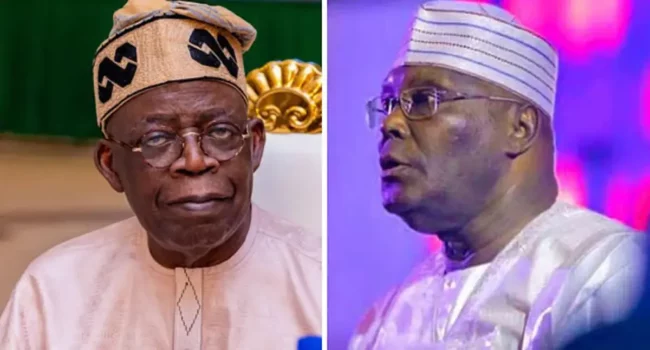The Supreme Court has fixed Monday, the 23rd of October as hearing date in the appeal submitted by former vice President Atiku Abubakar against President Bola Tinubu’s electoral victory.
According to a hearing notice dated October 19 and signed by the Chief Registrar of the Supreme Court, Zainab Garba, Atiku’s appeal marked SC/CV/935/2023 has been scheduled for Monday, October 23.
Africa Today News, New York reports that the PDP presidential candidate had on the 19th of September approached the apex court where he filed 35 grounds appeal challenging the verdict of the presidential election petitions which upheld Tinubu’s victory in the election.
A five-member panel of the Presidential Election Petition Court (PEPC) headed by Justice Hassan Tsammani had in its judgment on 6th September dismissed the petitions filed by Atiku and his Labour Party counterpart, Peter Obi, for lack of merit.
The former Vice President had also applied to the Supreme Court to file fresh evidence obtained from the Chicago State University against the president.
Read Also: You’re Completely Clueless On Governance, Atiku Hits Tinubu
Atiku has continued to insist that the President’s academic records are riddled with discrepancies and forgery and asked the apex court to kick him out of office.
The former vice president, through his team of lawyers, led by Chris Uche, a Senior Advocate of Nigeria (SAN), argued that the PEPC’s judgement occasioned ‘grave error and miscarriage of justice’ in its legal reasoning by upholding Mr Tinubu’s election as president.
In the document dated 18 September filed at the Supreme Court, Mr Uche contended that the presidential election court failed to adequately evaluate his client’s evidence before reaching its conclusions.
The lawyer faulted the court’s use of ‘disparaging words’ against Atiku which ‘evinced bias.’
In another ground of appeal, Mr Uche told the Supreme Court that the lower court’s conclusions “did not represent the true picture of the grounds of his petition”.
He further contended, amongst other issues, that the presidential election court erred in law when it “failed to nullify the presidential election held on 25 February 2023 on the grounds of non-compliance with the Electoral Act, 2022, when by evidence before the tribunal, INEC conducted the election based on grave and gross misrepresentation contrary to the principles of the Electoral Act 2022, based on the ‘doctrine of legitimate expectation.’
Act, 2022, when by evidence before the tribunal, INEC conducted the election based on grave and gross misrepresentation contrary to the principles of the Electoral Act 2022, based on the ‘doctrine of legitimate expectation.’
He further argued that the lower court erred by refusing to uphold the mandatoriness of electronic transmission of results for confirmation and verification of final results introduced by the Electoral Act 2022 aimed at boosting election “transparency and integrity.”
The PEPC had in its verdict said Atiku was unable to prove that the Electoral Act compels INEC to collate the election results using the electronic collation system.
Atiku’s lawyer referred the Supreme Court to INEC’s sole witness, Lawrence Bayode’s testimony while being cross-examined that the ‘deployment of the Bimodal Voters Accreditation System (BVAS) and IReV was to guarantee the transparency of the electoral process and the integrity of the results.’
Pointing out another grouse with the PEPC, Mr Uche faulted the court’s “shifting of the burden of proof” on Atiku instead of INEC concerning the issue of non-compliance with electoral laws.
He explained that presiding officers from polling units having confirmed “selective transmission of” parliamentary election results as against the presidential poll, “the onus shifted to” INEC “to call evidence to explain the selective transmission” and “the vague excuse of technical glitch.”
Referencing the Electoral Act, the appellant said the lower court erred when it failed to to invalidate Mr Tinubu’s election on account of INEC’s conduct of the poll in “grave and gross misrepresentation” of the Electoral Act and “doctrine of legitimate expectation.”
On the issue of 25 percent votes in two-thirds of the FCT, Atiku said the interpretation of the word “and” I. section 134(2)(b) of the constitution is “conductive and not disjunctive.
He said the provisions of the section are “clear and unambiguous”, adding that a “literary and and ordinary construction will best define the intention of the framers of the constitution.”
Atiku further contended that the lower caused “grave injustice” when it “expunged” the witness statements on oath of 13 out of his 27 witnesses from its records.
The presidential election court in its ruling had said Atiku failed to file his petition alongside the witnesses’ statements on oath.
“The long and short of all the foregoing is that the objection of the respondents to the witnesses statements…which did not accompany the petition as required by …the First Schedule of the Electoral Act, is hereby sustained and the said witnesses statements, being incompetent are hereby struck out and expunged from the records of this court,” the PEPC had ruled.
Meanwhile President Bola Tinubu and his APC have urged the apex court to dismiss Atiku’s appeal for lacking in merit.

